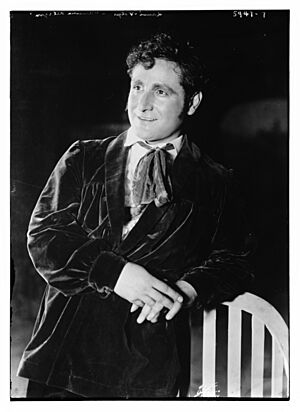Giacomo Lauri-Volpi facts for kids
Giacomo Lauri-Volpi (born December 11, 1892 – died March 17, 1979) was a famous Italian tenor. A tenor is a male singer with a high voice, often heard in opera. Lauri-Volpi had an amazing voice that could reach very high notes easily. He performed in operas all over Europe and the Americas for 40 years.
Contents
Giacomo Lauri-Volpi's Life and Career
Early Life and Training
Giacomo Lauri-Volpi was born in Lanuvio, Italy. He became an orphan when he was 11 years old. He studied at the University of Rome. Later, he began to train his voice with a famous teacher named Antonio Cotogni. This training happened at the Liceo Musicale in Rome.
Start of His Singing Career
His singing career was put on hold because of World War I, which started in 1914. He served in the Italian army and became a captain. He was even one of Italy's most decorated soldiers.
After the war, he started his opera career. His first big performance was in 1919 in Viterbo, Italy. He sang the role of Arturo in Bellini's I Puritani. For this show, he used the name Giacomo Rubini. A few months later, in 1920, he performed in Rome under his real name. He sang in Massenet's Manon with other great singers.
Performing in Famous Opera Houses
Lauri-Volpi became very well known for his shows at La Scala in Milan, Italy. This is one of the most famous opera houses in the world. In 1929, he was chosen to sing in a special show. It was the 100th anniversary production of Rossini's Guglielmo Tell.
He also sang at the New York Metropolitan Opera from 1923 to 1933. He performed there more than 300 times. During this time, he sang in the first American show of Puccini's Turandot. He also performed in the first Met show of Verdi's Luisa Miller. His time at the Met ended because of a disagreement. The opera house wanted him to take less money because of the Great Depression. He refused and went back to Italy.
Lauri-Volpi also performed at the Royal Opera House, Covent Garden, in London. His voice changed over time. He started with lighter roles and then sang more challenging ones. Even as he got older, his amazing high notes stayed strong.
During Second World War, Lauri-Volpi stayed in Italy. He was admired by the leader of Italy at the time, Benito Mussolini. His last public opera performance was in 1959. He sang the role of Manrico in Verdi's Il Trovatore in Rome.
His Voice and Legacy
Lauri-Volpi made many recordings when he was most famous. His voice was bright, flexible, and clear. He could reach very high notes easily. He had a special vibrating sound in his voice called a vibrato. This made his voice easy to recognize on recordings and in live shows.
He sang many different types of roles, from light ones like Arturo to powerful ones like Otello. He is remembered as one of the greatest opera singers of the 20th century. He retired to Spain after World War II. He died in Burjassot, near Valencia, when he was 86 years old.
Recordings and Books
His Recordings
In the 1920s and 1930s, Lauri-Volpi made many recordings of opera songs. He recorded for companies like Fonotipia, Brunswick, Victor, and HMV. His recordings for Victor and HMV are thought to be his best. You can still find these recordings on CDs today.
In 1947, he recorded parts of the opera Rigoletto. In the 1950s, he recorded some full operas. These later recordings do not show his voice at its very best. Some of these operas include:
- La bohème, Il trovatore, and Luisa Miller (all from 1951)
- Il trovatore and La favorita (both from 1954, recorded live)
- Gli Ugonotti (from 1955)
There is also a live recording of Il trovatore from 1951. In this recording, he sings with the famous singer Maria Callas. All these recordings are available on CD.
In 1974, when he was 81, Lauri-Volpi released one last opera recording. He also appeared in a German film in 1933 called Das Lied der Sonne. In the film, he played himself.
His Writings
Lauri-Volpi also wrote several books. His most famous book is Voci Parallele. This book talks about singers and how they use their voices. It is often used by historians who study music. His main published books include:
- Voci Parallele (published in Milan, 1955)
- L'Equivoco, Cosi è, e non vi pare (published in Milan, 1938)
- A viso Aperto (published in Milan, 1953)
An English version of Voci Parallele, called Parallel Voices, was published in 2022.
See also
 In Spanish: Giacomo Lauri-Volpi para niños
In Spanish: Giacomo Lauri-Volpi para niños
 | Dorothy Vaughan |
 | Charles Henry Turner |
 | Hildrus Poindexter |
 | Henry Cecil McBay |


